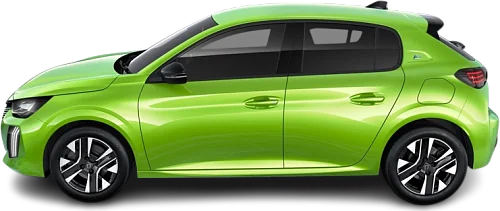Peugeot e-208 50 kWh vs Renault Twingo Z.E. Base
Struggling to Decide? Let AI Help!
Your AI Summary Is Ready!
General Info
While the Peugeot e-208 50 kWh (2023-…) is currently produced, it is not offered for sale in the United States. The Renault Twingo Z.E. (2020-2024) has been discontinued, it was never offered for sale in the United States.
The two vehicles share the same body style: Hatchback.
| Property | Peugeot e-208 50 kWh | Renault Twingo Z.E. Base |
|---|---|---|
| Years of Production | 2023-… | 2020-2024 |
| Current Status | Produced | Discontinued |
| Country of Manufacture | Slovakia | Slovenia |
| Body Style | Hatchback | Hatchback |
| Market Availability | EU | EU |
| GCC Score | 5 | 5 |
Range and Efficiency
While the Peugeot e-208 50 kWh (2023-…) offers a longer real-world range and a bigger battery, it is less energy-efficient than the Renault Twingo Z.E. (2020-2024).
| Property | Peugeot e-208 50 kWh | Renault Twingo Z.E. Base |
|---|---|---|
| Range (WLTP) | 225 mi | 118 mi |
| Range (GCC) | 193 mi | 101 mi |
| Battery Capacity (Nominal) | 50 kWh | 23 kWh |
| Battery Capacity (Usable) | 46.3 kWh | 21.3 kWh |
| Efficiency per 100 mi | 24 kWh/100 mi | 21.1 kWh/100 mi |
| Efficiency per kWh | 4.17 mi/kWh | 4.74 mi/kWh |
| Range and Efficiency Score | 6.8 | 6.2 |
Charging
Both vehicles utilize a standard 400-volt architecture.
The Renault Twingo Z.E. (2020-2024) has no DC fast charging capability, whereas the Peugeot e-208 50 kWh (2023-…) can charge at up to 101 kW.
The Renault Twingo Z.E. (2020-2024) features a more powerful on-board charger, supporting a maximum AC charging power of 22 kW, whereas the Peugeot e-208 50 kWh (2023-…) is limited to 7.4 kW.
| Property | Peugeot e-208 50 kWh | Renault Twingo Z.E. Base |
|---|---|---|
| Max Charging Power (AC) | 7.4 kW | 22 kW |
| Max Charging Power (DC) | 101 kW | - Max Charging Power (DC) |
| Architecture | 400 V | 400 V |
| Charge Port | CCS Type 2 | Type 2 (Mennekes) |
| Charging Score | 4.3 | 5.7 |
Performance
The Renault Twingo Z.E. (2020-2024) is rear-wheel drive, while the Peugeot e-208 50 kWh (2023-…) offers a front-wheel drive system.
The Peugeot e-208 50 kWh (2023-…) boasts greater motor power and accelerates faster from 0 to 60 mph.
| Property | Peugeot e-208 50 kWh | Renault Twingo Z.E. Base |
|---|---|---|
| Drive Type | FWD | RWD |
| Motor Type | PMSM | PMSM |
| Motor Power (kW) | 100 kW | 60 kW |
| Motor Power (hp) | 134 hp | 80 hp |
| Motor Torque | 192 lb-ft | 118 lb-ft |
| 0-60 mph | 8.6 s | 12.1 s |
| Top Speed | 93 mph | 84 mph |
| Performance Score | 2.8 | 1.7 |
Dimensions
The Peugeot e-208 50 kWh (2023-…) is longer and wider, but the Renault Twingo Z.E. (2020-2024) is taller.
Both models have similar wheelbase lengths.
| Property | Peugeot e-208 50 kWh | Renault Twingo Z.E. Base |
|---|---|---|
| Length | 159.6 in | 142.3 in |
| Width (with Mirrors) | 77.2 in | 73.8 in |
| Width (w/o Mirrors) | 69.5 in | 64.8 in |
| Height | 56.3 in | 60.7 in |
| Wheelbase | 100 in | 98.1 in |
Cargo and Towing
The Peugeot e-208 50 kWh (2023-…) provides more cargo capacity, featuring both a larger trunk and more space with the rear seats folded.
Neither car is equipped with a frunk (front trunk).
Neither vehicle is officially rated for towing in the US.
| Property | Peugeot e-208 50 kWh | Renault Twingo Z.E. Base |
|---|---|---|
| Number of Seats | 5 | 4 |
| Curb Weight | 3373 lb | 2452 lb |
| Cargo Volume (Trunk) | 9.4 ft3 | 6.6 ft3 |
| Cargo Volume (Max) | 39.1 ft3 | 34.6 ft3 |
| Cargo Volume (Frunk) | - Cargo Volume (Frunk) | - Cargo Volume (Frunk) |
| Towing Capacity | - Towing Capacity | - Towing Capacity |
| Cargo and Towing Score | 3.5 | 3.9 |




